| 808 STATE: PARADISE REGAINED | |
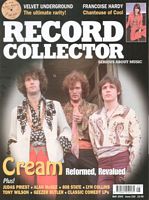 |
Record Collector Issue 310 May 2005 Page: 46 |
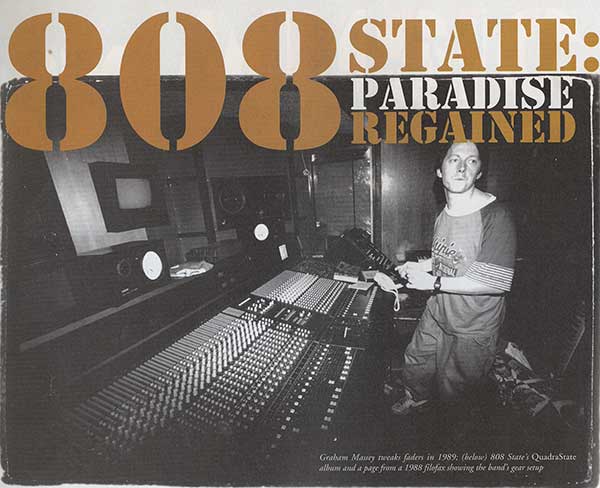 The Manchester scene wasn't just New Order, the Mondays and the Roses. A new collection of 808 State's early work demonstrates their crucial role in the establishment of electronic dance music in the UK, says STUART AITKEN "If you're a dance music fan these recordings are almost like a missing link," enthuses Aphex Twin about 808 State's 1988 acid house remixes of New Order classics Blue Monday and Confusion which surfaced on vinyl recently. "Bands like New Order helped create house, acid and techno. This is 808 State paying homage to their elders." The New Order remixes are just part of a collection of material salvaged by 808 State's Graham Massey and released for the first time on Aphex Twin's Rephlex label. Also included in the haul is a radio jam, a rare early release recorded under the name The Lounge Jays, the group's first ever live performance and recordings made in Gerald Simpson's attic - all now available for the first time on CD under the name Prebuild. The reason behind Aphex Twin's decision to release the records is simple: "I am a major acid trainspotting historian and 808 State fan," he explains. As a result, over the years, Aphex Twin has repeatedly sought to expose new audiences to 808 State's early output. First in 1999, he re-released the group's seminal debut album, Newbuild, on triple vinyl. Next came a remix of the album's stand-out track Flow Coma, released on Men Records, enigmatically titled Two Mixes By AFX. These latest releases complete the set.  So why the reverence? Aphex Twin explains that when he was growing up in the late 1980s there was quite simply no-one to compare to 808 State. "They had their own unique take on acid and music," he argues. Remarkably. all the material on the 'new' releases was recorded between 1986 and 1988, thus highlighting the fact that long before D-Mob's dreadful We Call It Acieed turned acid house into something of a national joke, 808 State were finding radical new possibilities in the exhilarating new music. Taking shape on the recordings is a raw new sound which in the months to come would transform British music - and the broader cultural climate - beyond all recognition. It was a sound which entranced the young Aphex Twin: "I came up to London when I was 17 in 1988 to earn some money and all I did apart from work was flick through all the pirates and tape as much as possible to take back to Cornwall. I had two tape recorders/radios on the go on my last weekend and they were all constantly rinsing every track off Newbuild although then I didn't know that my favourite tracks from the tapes were mostly from one album. I totally freaked when I eventually worked out what it was." If these tracks that Aphex Twin loved so much as a youth were so far ahead of their time, we are forced to wonder just how they came about.  At the centre of the story is a young musician from the rough side of Manchester who was later to assume the name A GUY CALLED GERALD. Growing up in Hulme, Gerald Simpson was influenced by a diverse range of source materials. As a teenager in the early I 980s he was a fan of jazz fusion musicians like Chick Corea and Herbie Hancock. Importantly, Gerald was not just interested in the end product, he was also fascinated by the equipment: "I was really into the keyboards they would use like Mini Moogs and Micro Moogs and Arp Odysseys and all these old-school analogue synths. I got into knowing what the keyboards were through reading the back of these LP covers." One sleeve in particular was to have a profound influence on the young Gerald. "One of the first LPs I heard of Herbie Hancock's was Sunlight," he says. "The LP cover has got him surrounded by all these keyboards that you'd never ever seen in your life. It's a great cover." From Herbie Hancock and his electronic experiments, Gerald discovered electro. Listening to old school cuts like Pumpkin's Here Comes That Beat and early Mantronix material was something of a turning-point for Gerald as he began to realise that he could simulate the music he was listening to. The Roland TR 808 drum machine was a staple and, sure enough, in 1986, it was the first piece of equipment that Gerald bought. "One day I went down to the shop (Al Music in Manchester) and they had a second-hand one in," he remembers. "I couldn't believe my luck." The TR 808 cost him £300 - a serious bargain by today's standards. Another bargain was a Roland TB 303 Bass Line (303), the machine now synonymous with the acid house sound - amazingly, Gerald paid just £50 for his. In 1987, Chicago's Phuture elevated the 303 to mythical status when they became the first artists to tease the now- famous sounds out of the machine, cracking the acid code and releasing the genre-defining Acid Trax. Curiously however, Gerald's initial impetus for buying the 303 came not from acid house but from early rap records. 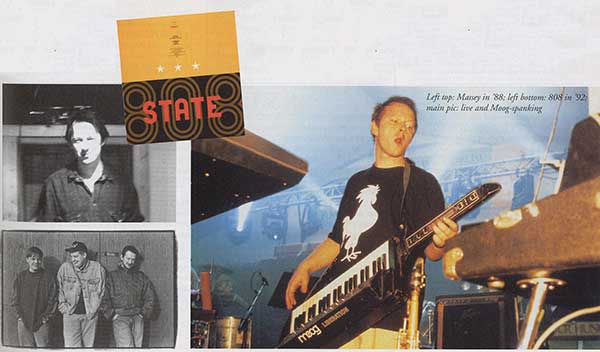 "One of my influences for getting a 303 in the first place was an Ice-T record called Dog N The Wax," he says. "I got it to try and do that really cold bass-line. I used to do stuff like that and then cut and scratch over it onto tapes." Now, armed with the necessary rudimentary equipment to begin experimenting with sounds, another revelation was to follow. "I remember hearing an acid track on the radio," says Gerald. "It was an imported track from Chicago on the Stu Allen show. Listening to that I was like 'Shit, I've got one of them machines'. I thought there was no way I would ever be able to do something in a studio but when I heard that track I was like 'Someone's done that on a record?' After that I used to send tapes in to the radio station and they would play them and I was like `Cool. Let's make some records'." Gerald was not alone, of course. GRAHAM MASSEY had fronted industrial band Biting Tongues in the mid 1980s and as such was a somewhat more unlikely convert to acid house than Gerald. However Massey explains that Stu Allen's show was key for him too, introducing him to the new sound around 1987. At the time Massey was studying sound engineering and was also running a coffee shop across the road from Manchester's highly influential Eastern Bloc record shop. From here, Martin Price was selling imports of the new records coming out of Chicago and Detroit. The shop became a hotbed for musical activity. Massey, Simpson and Price were drawn together and 808 State was formed. "It was an odd hand because we didn't have an enormous amount of common ground," says Massey. "My knowledge of electronic music was more kind of like Throbbing Gristle, Cabaret Voltaire, the dark raincoat side of things. But having said that I also had a big jazz background as well. My favourite stuff was quite colourful exotic jazz records by the likes of Martin Denny." This interest in exotica would of course be a crucial factor in later 808 State recordings like the seminal Pacific State. In contrast to this, Massey explains that Price was more interested in the American import, dance music side of things, along with more anarchic work by artists like Negativland and On-U-Sound. By putting the three together, this clash of influences inspired the group in their formative years. The different elements at play within the group were responsible for the explosive, experimental and often unpredictable sound. 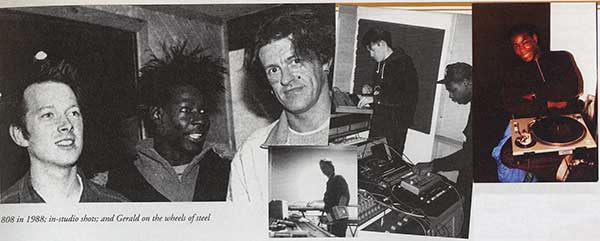 Perhaps most importantly though for the young band, Massey had access to a recording studio - Spirit Studios on Tariff Street. "Obviously studio time was tight but I managed to get in a position of trust with the owner - almost like being the janitor, looking after locking up at night, which was abused quite a bit," says Massey. "We'd go out clubbing and go back in at 2 in the morning. Gerald was working at McDonalds at the time and he had to be in at 7am. We'd just work all night and then go and have a free McDonalds in the morning round the corner." The beginnings then were humble for the group. "Gerald had these sort of nylon laundry bags for all the equipment and I had one of those old ladies' shopping trolleys - you know, with the two wheels and the tar-tan bag - we could turn up anywhere with that," says Massey, illustrating the point. "I remember going and playing Aberdeen Art College. We got on the national coach with our laundry bags and things and went up and played. They showed a load of porn films over us." Hardly Wembley Arena, then, but the gigs were crucial to the group. Massey points our that the next day they bought a Roland 909 drum machine with the proceeds. In the beginning, the music that the trio was beginning to play live was viewed with suspicion. The group's audience in those days - mostly at clubs and raves around Manchester - tended to be hip-hop fans who, according to Massey, "instantly labelled it weird gay music. They were quite hostile to it really". This seems surprising in a city known for its openness to different types of music and perhaps highlights just how alien the acid sound was at the time. There was an acceptance of the emerging dance music championed by the likes of Steve 'Silk' Hurley. However, the members of 808 State were more interested in the harder-edge material being produced by Chicago artists like Adonis. Another key influence was early Detroit techno which was starting to find its way out of Motor City. Gerald explains: "I used to just wander around an industrial area of Manchester called Trafford Park with my headphones on listening to Derrick May and all that kind of stuff. It totally fitted with the scenery". In the early years, however, these new records were hard to get hold of. 808 State used this to their advantage. "It was a case of supply and demand because you couldn't get that kind of stuff," says Massey. "You'd buy Acid Trax albums and they were quite patchy, they'd have a couple of good tracks on them. The demand and supply thing wasn't sorted out so in a way we were just filling in the gaps." As the sound began to catch on and things began to kick off in Manchester, 808 State were required to fill more and more gaps. As the city was gripped by acid house fever, the group found itself in the eye of the storm. "It was really exciting because basically the Hacienda had started to take off," explains Gerald. "All of a sudden it kind of flipped. There was the introduction of some kind of chemical from somewhere," says Gerald laughing. "I'd heard about ecstasy for a while, but it just kind of came in a wave." For Gerald, and Manchester as a whole, things really began to take off in the summer of 1988, coinciding with Jon Da Silva's legendary Hot night which ran between July and December 1988 - acid house's extended summer of love. "I don't think anyone really had much of a clue what was going on with ecstasy" says Gerald. "Slowly more and more people started to come. Some people who you wouldn't even expect to be in a club would be there dancing. Because I didn't do any kind of drugs or anything like that, I'd be looking at all these people thinking, this is weird they're really getting into this. But even without drugs you kind of got caught up in it. There was a kind of euphoria." As the Hacienda reached fever pitch, the club's big night needed a theme tune. Enter 808 State. "There was one time when we were talking to Jon Da Silva," says Gerald. "He wanted a theme tune for his Hot night so me and Graham thought of doing a New Order tune, because they were the management of the club basically. It wasn't going to be used as a record or anything, he wasn't going to press it up, it was just basically to be played on his Hot night. So we did versions of Confusion and Blue Monday", he laughs. 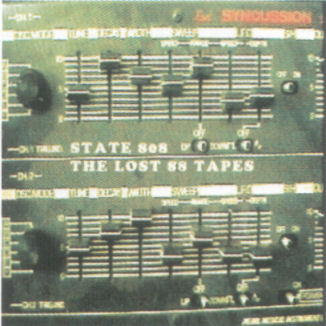 Massey explains that the tracks had previously been used in live sets: "I don't think any of us were particular mega-fans, but those tunes were just sort of every-where, they were so well-known. We used to do it in our set really early on because it was just something that people would recognise. It was kind of catering a little bit because the rest of it was so abstract." Now the track which began life as a way of sustaining the interest of a sceptical audience was used to whip the Hacienda crowd into a frenzy. The track was given the addition of Gerald's haunting vocal - 'it's so hot at the disco' - and the party continued long into of 1988. However, as the rest of Manchester - and the UK - finally started to understand the music that 808 State had been forging, Massey explains that the group was already looking to move on. "Once the music was cross-pollinated with drug culture, that's when it really became established. But by that time we weren't really making acid. It seems like such a short time that we were doing that acid stuff to me in retrospect." Musically, Massey seems eager not to overplay the group's acid period output. "To a certain extent the early acid stuff was more like other people's music - it had less of an identity to it. By the time we got on to the QuadraState album we were more confident about making a statement rather than trying to copy American music." That aside how ever, Massey does still marvel at the rawness of the recordings. "The music does have a sort of natural raw appeal as early rock and roll does. It's just kind of basic and you can't argue with it." If the music had a raw, jagged edge, the comedown from the euphoria of those early days was equally spiky. Just as the Hacienda dream started to turn sour as the gangs moved in, so the magic ended for the first incarnation of 808 State. Despite enjoying a huge national and international profile following the release and chart success of Pacific, success quickly turned to dispute as the group were torn apart when Gerald's name was not credited on the single. The dispute raged for what seemed like years, being played out as a bitter feud on the front pages of the nation's musical press. Sadly what should have been the group's finest hour and critical launch pad was tarnished forever. In the aftermath, Gerald struck out alone and has built up a reverential following - if not an enormous bank balance - on the back of his experimental approach to music. Landmarks have been the hugely influential drum'n'bass albums 28 Gun Bad Boy (1992) and Black Street Technology (1995). Following Gerald's departure, Massey and Price drafted in well-known Manchester DJs Andrew Barker and Darren Partington. As the Madchester scene became fully established spawning what became known as the baggy scene, the new line up went on to record a number of extremely successful albums such as 1989's Ninety and 1991's Ex:El which featured the vocals of Björk and Bernard Sumner and did much to further the indie/dance crossover movement. The group's success and musical direction was not to everyone's taste however. Martin Price left in 1992. "I never thought we were a band," he explains. "I never wanted to do any live stuff or anything like that. I got dragged along with it basically and to me it wasn't right for what was going on. "I still do bits of music every day, all the time with no particular aim. It's just therapy for me", he explains. "When I get up I check what crap 1 did last night. I reject it or I put it some place else." Massey continues to be the public face of 808 State and with Barker and Partington released Gorgeous (1993) and Don Solaris (1996). Recent years have seen him diversifying, fronting the collaborative outfit Toolshed and work with fellow Mancunians Homelife. His passion for experimentation is still very much alive. Sadly, the three original members have never worked together since the late 1980s. A story from Gerald does offer some hope however: "I remember a few times going over to Aphex's place and jamming - he's got a little analogue studio. It totally reminded me of the old days. He even got me and Graham round there at the same time." This says much about Aphex's involvement. Perhaps a reunion is not totally out of the question... [Author: Stuart Aitken] |
|
SEAN BOOTH OF AUTECHRE: "I was 16 in college in Salford at the time, studying sound, and used to be in Eastern Bloc a lot. Martin Price would hook me up with good acid 12"s and one day got out Deepville 12 and played it going 'we did this' and I got it off him being dead nosey asking what studio they used etc. I thought Newbuild was top when it came out. We already knew Gerald's stuff, unavoidable in Manchester really, big fans of that as well. Also Stakker were in same college doing Eurotechno. I left college soon after to get job/buy more kit. I think seeing all these people doing really good stuff, I remember thinking that none of them needed the studios they were using, that they could have just done it at home. I thought probably most of the best tracks I was hearing at that time had been done at home. Such small boxes, it just seemed logical. So yeah they inspired us not to use professional recording studios at all. College seemed so stale after meeting all these people I just wanted freedom". |
|
Q&A: APHEX TWIN What was your experience of discovering 808 State as a youth in Cornwall? It fitted for me down there. I used to have it on my Walkman a lot. I remember listening to E-talk and hearing those strange synth pads, it was a minor revelation for me. It was the best soundtrack to drizzling rain, cold and the damp. What do you think of New Order's original Blue Monday? Unbelievable, they really did it there. Listen to Our Love by Donna Summer/Georgio Moroder for the major inspiration. Was it an influential record when you were growing up? It was just too well produced for me to relate to. Maybe if someone had lent me a mixer instead of my shit home-made one I would have liked it even more. The production is what really makes it. Did you ever go to the Hacienda? No. The closest I got was a Cornish TV program about Madchester which I still have on VHS. It had interviews with all of 808 State, Gerald and Derrick May in the studio! And stories about the Hacienda. Top programme. Many people with an interest in music will argue that there is no need for a remix of Blue Monday - that is, many will say it's a classic and doesn't need a remix. Yes but it's got Gerald singing on it and the same acid riff from In The Beginning and everything. What more could you ask for? I really like the Confusion mix, lushly lo-fi compared to the super-slick Arthur Baker produced original mega tune - kind of like 'Can't afford an SSL desk, lexicon setup mix'. I'd love to remix Blue Monday from the original masters and make it less commercial. Anyone got the tapes? |
|
10 UNEXPECTED 808 STATE MIXES Rolf Harris Sun Arise (808 Dub, 808 Vocal and 808 State mixes) (1997) |
|
TOP 5 808 STATE RARITIES 4/88 Eastern Bloc EASTERN 001 Wax On The Melt/SPM MC Tunes/Shure.4 (12" as The Hit Squad, white label promo, plain sleeve with sticker) £30 |
|